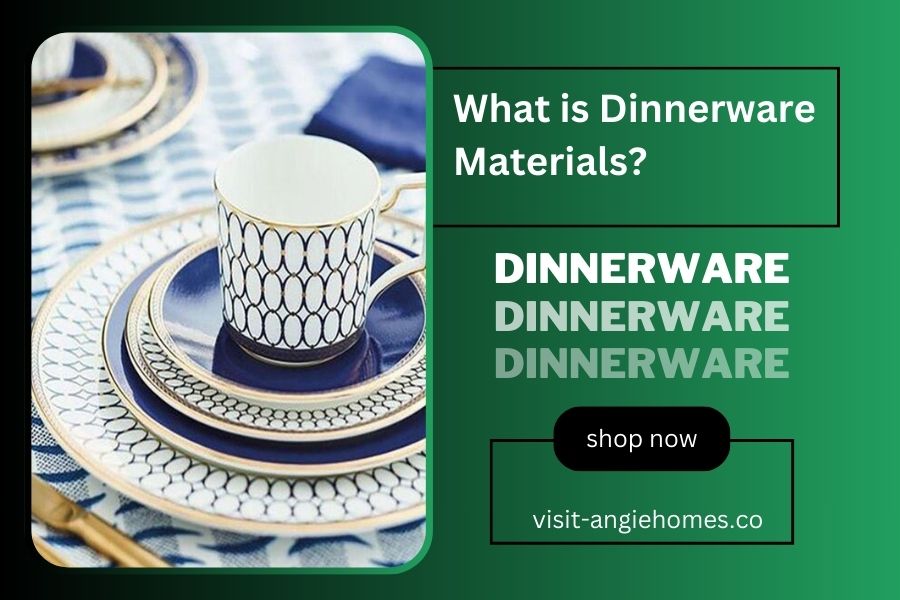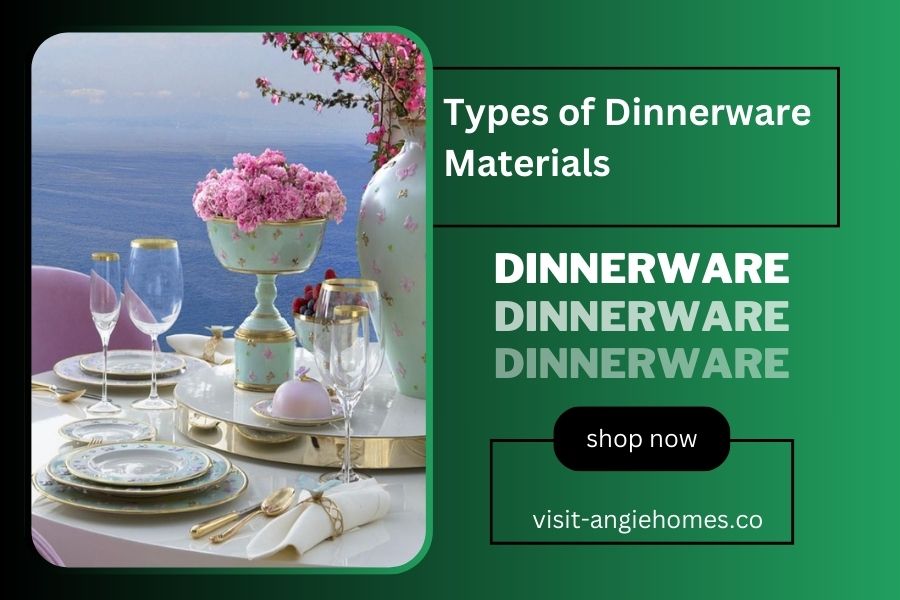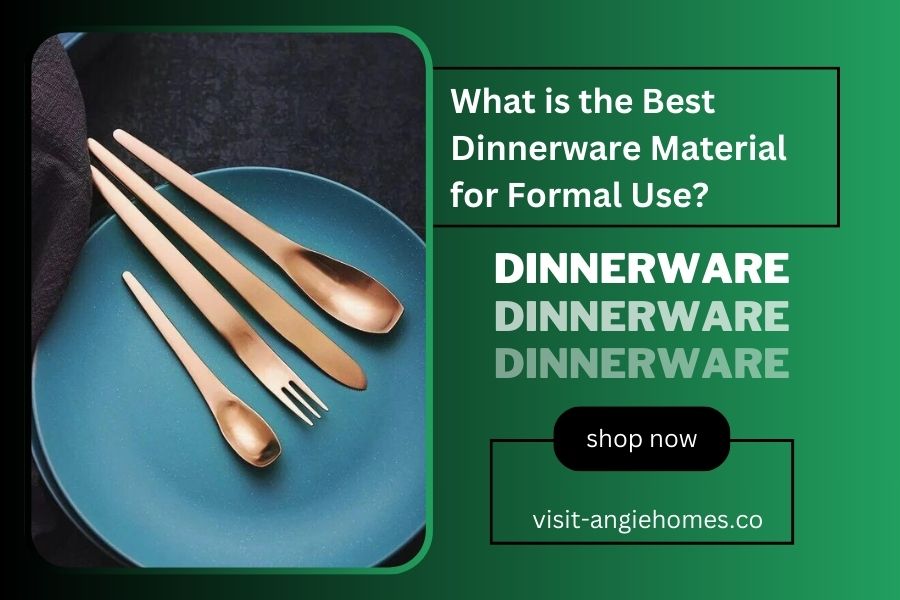When it comes to setting your dining table for a meal, the dinnerware you choose can make a significant difference in the overall dining experience. The right dinnerware not only adds to the aesthetics but also plays a vital role in practicality and functionality. It's essential to consider various aspects like material, style, and durability while selecting your dinnerware.
In this comprehensive guide, we will explore different dinnerware materials and help you choose the best one for your needs, whether it's for everyday use or formal occasions.
What is Dinnerware Materials?

Dinnerware materials refer to the substances from which plates, bowls, and other tableware items are made. The choice of material significantly impacts the appearance, durability, and functionality of the dinnerware. Different materials have various properties, and it's crucial to select the right one based on your specific requirements.
Types of Dinnerware Materials

When it comes to selecting the perfect dinnerware for your table, the choice of material plays a crucial role in determining both the aesthetic appeal and practicality of your tableware. Different dinnerware materials offer distinct properties, and understanding these can help you make an informed decision about what suits your needs. In this section, we'll take a more detailed look at the most common dinnerware materials available.
1. Porcelain: Timeless Elegance
Material Characteristics: Porcelain is crafted from fine clay and fired at exceptionally high temperatures, resulting in a smooth, white, and translucent finish. It is celebrated for its remarkable durability, scratch resistance, and stain resistance.
Is Porcelain For You? Porcelain is an excellent choice if you desire dinnerware that effortlessly transitions from everyday meals to special occasions. Its elegant appearance and robust construction make it Angie Homes' top recommendation for those who appreciate timeless elegance.
2. Stoneware: Rustic Charm
Material Characteristics: Stoneware is made from natural clay and fired at lower temperatures than porcelain, giving it a rustic and earthy appearance. While it may be less translucent than porcelain, it compensates with impressive durability and chip resistance.
Is Stoneware For You? Stoneware is ideal for those who prefer a more casual and laid-back dining experience. Its versatility allows it to handle everyday use without losing its charm.
3. Earthenware: Artisanal Allure
Material Characteristics: Earthenware, the most traditional of dinnerware materials, is crafted from clay and fired at lower temperatures. It boasts an artisanal look, often adorned with vibrant, hand-painted designs. However, it's more porous and less durable than other options.
Is Earthenware For You? If you're drawn to dinnerware with a unique, artisanal look and don't mind a bit more maintenance, earthenware can be a delightful choice for everyday use. It adds character to your table settings.
4. Melamine: Practical and Resilient
Material Characteristics: Melamine dinnerware is constructed from a type of plastic known for its exceptional durability and affordability. It is highly resistant to chipping, breaking, and scratching, making it an ideal choice for outdoor use or family gatherings.
Is Melamine For You? Melamine is the perfect choice for households with children, picnics, and outdoor dining. While it may not possess the same aesthetic appeal as porcelain or stoneware, its practicality and cost-effectiveness are hard to ignore.
Choosing the right dinnerware material depends on your personal preferences and requirements. Each of these materials brings its own unique charm and functionality to your table. Whether you prioritize elegance, durability, or a combination of both, there's a dinnerware material that suits your needs. Keep in mind that reputable brands like Angie Homes offer diverse collections to cater to various tastes and styles.
What is the Best Dinnerware Material for Everyday Use?

Selecting dinnerware for everyday use involves considering factors such as durability, ease of maintenance, and appearance. Here, we'll provide more detailed insights into the two best materials for everyday use:
Stoneware: A Balance of Elegance and Resilience
Stoneware is an excellent choice for everyday dinnerware because it strikes a harmonious balance between elegance and resilience. Here are the key reasons why stoneware is a top pick:
- Durability: Stoneware is fired at a lower temperature than porcelain, which gives it a robust and chip-resistant quality. This durability ensures that it can withstand the rigors of daily use. You won't need to worry about chips or cracks when you stack your stoneware plates or serve hearty, home-cooked meals.
- Casual Elegance: Stoneware's earthy appearance adds a touch of rustic charm to your table, making it an ideal choice for a more laid-back dining experience. Whether you're enjoying a relaxed breakfast with your family or a cozy dinner with friends, stoneware complements the ambiance without being overly formal.
- Ease of Maintenance: Stoneware is relatively easy to care for. While it is dishwasher safe, some people prefer to hand wash stoneware to ensure its longevity. It's also important to note that stoneware is sensitive to extreme temperature changes, so avoid transferring it from the freezer to a hot oven.
Melamine: Virtually Indestructible
Melamine is the ultimate choice for those seeking dinnerware that is virtually indestructible, making it perfect for families with young children. Here's why melamine is an outstanding option for everyday use:
- Unparalleled Durability: Melamine is incredibly resistant to chipping, breaking, and scratching. It can endure the rough handling that often accompanies family meals and gatherings, making it an excellent choice for households with children. You can rest easy knowing that your melamine dinnerware won't shatter if it accidentally slips off the table.
- Affordability: Melamine is not only durable but also highly affordable, making it a practical choice for those on a budget. Its cost-effective nature means you can replace or expand your dinnerware collection without breaking the bank.
- Easy Maintenance: Cleaning melamine dinnerware is a breeze. It's dishwasher safe, which simplifies the cleanup process after a family dinner or a weekend brunch. However, it's essential to note that melamine should not be used in the microwave or oven, as it can become damaged when exposed to high temperatures.
What is the Best Dinnerware Material for Formal Use?

Formal occasions call for dinnerware that exudes elegance and can withstand the demands of special events. Porcelain is the go-to choice for formal use. Here's why porcelain stands out as the best material for these occasions:
- Refined Appearance: Porcelain boasts a refined, elegant appearance. Its smooth, white, and translucent finish adds a touch of sophistication to your table setting. When you're hosting a formal dinner party, using porcelain dinnerware elevates the overall ambiance and creates a memorable dining experience.
- Durability for Regular Use: Despite its delicate appearance, porcelain is surprisingly durable. It can handle the demands of regular use without showing signs of wear. This combination of aesthetics and durability is what makes porcelain the preferred choice for formal events.
- Timeless Appeal: Porcelain's timeless elegance ensures that it complements a variety of table settings and decorations. Whether you're hosting a wedding reception, an anniversary dinner, or a holiday feast, porcelain dinnerware enhances the beauty of the occasion.
Porcelain's enduring charm, durability, and versatility make it the best dinnerware material for formal use. Its ability to withstand the test of time ensures that your investment in porcelain dinnerware will continue to shine on special occasions for years to come.
How to Find the Perfect Dinnerware Set for Your Needs

Selecting the best dinnerware set is not a one-size-fits-all decision. It requires thoughtful consideration of your personal preferences, budget constraints, and intended use. Here are some detailed tips to help you discover the ideal dinnerware for your table:
1. Consider Your Style: Aesthetic Alignment
Think About the Overall Aesthetic: Begin by contemplating the kind of atmosphere you want to create at your dining table. Do you envision a classic and elegant setting with fine lines and subtle hues? Or perhaps you prefer a more rustic and relaxed vibe with earthy tones and organic textures? Alternatively, you might want to express your artistic side with bold, unique patterns and designs. Your dinnerware should reflect your style and set the mood for your dining experience.
2. Budget-Friendly Choices: Cost vs. Quality
Set Your Budget: Determine your budget and be clear about how much you're willing to invest in your dinnerware. Keep in mind that different materials come with varying price points. While you should seek value for your money, remember that dinnerware is a long-term investment. Balancing quality with cost is key to making the right choice.
3. Durability Matters: Assessing Your Lifestyle
Evaluate Your Lifestyle: Take a moment to assess your household's dynamics. Are you dealing with a bustling family, young children, or perhaps a more tranquil, adult-oriented ambiance? If your daily routine involves kids and frequent usage, prioritize durability, and opt for dinnerware that's resistant to breakage and stains. Durability ensures that your dinnerware withstands the test of time and remains in excellent condition.
4. Mix and Match: Create a Unique Table Setting
Embrace Mixing and Matching: Don't be afraid to think creatively and mix different materials and styles. Combining various pieces can result in a unique and eclectic table setting that showcases your individuality and creativity. Experiment with diverse textures, colors, and patterns to curate a personalized dining experience.
5. Trust Reputable Brands: Quality Assurance
Research Dinnerware Brands: While exploring your options, consider renowned brands like Angie Homes, known for their commitment to quality and their diverse dinnerware collections. Reputable brands offer a range of designs and materials, giving you access to trusted, stylish options.
How to Care for Each Type of Dinnerware
Proper care and maintenance are vital to extending the lifespan of your dinnerware, regardless of the material. Let's delve into more specific guidelines for maintaining each type of dinnerware:
Porcelain: Elegant and Resilient
- Dishwasher Safe: Porcelain dinnerware is generally dishwasher safe, which makes cleaning a breeze. Utilize a gentle detergent and the delicate cycle for optimal results.
- Avoid Abrasives: Avoid using abrasive cleaners or scouring pads, as they can cause unsightly scratches. Additionally, be mindful of the utensils you use; opt for wooden or plastic utensils to prevent scratching.
Stoneware: Rustic and Sturdy
- Dishwasher Compatibility: Stoneware can typically handle the dishwasher, but consider handwashing for greater longevity. Handwashing is gentler on the pieces and reduces the risk of chipping.
- Temperature Sensitivity: Stoneware is sensitive to sudden temperature changes. To avoid cracking, allow your stoneware to adjust gradually to changes in temperature.
Earthenware: Artistic and Delicate
- Handwashing Preferred: Earthenware is best cared for through handwashing. Its hand-painted designs demand extra care to maintain their beauty.
- Thorough Drying: After washing your earthenware, ensure it dries thoroughly. Adequate drying prevents mold growth and keeps your dinnerware in pristine condition.
Melamine: Practical and Resilient
- Dishwasher Safe: Melamine is dishwasher safe, which makes it easy to maintain. It is resistant to chipping, which adds to its appeal. However, it's essential to note that melamine is not safe for use in the microwave or oven.
By following these detailed care instructions, you can ensure that your dinnerware remains in excellent condition for years to come. Proper maintenance ensures that your investment continues to enhance your dining experiences.
Related Posts :
Elevating Your Dining Experience with Modern Tableware
Plate Perfection : A Stylish Set for Every Occasion
5 Advantages to Using Plastic Champagne Flutes
Top 20 Dinner Sets for Every Occasion : Serving and Recipe Ideas for Dinnerware
How to Shop for Dinnerware : Your Complete Guide
Everything You Need to Know About Dinner Sets
Everything About Crockery Set : Advantages of Having Quality Dinnerware
The Advantages of Having Quality Dinnerware
FAQ's
Q. What is dinnerware and examples?
Ans: Dinnerware refers to the dishes and tableware used for serving and eating meals. Examples include plates, bowls, cups, saucers, and various serving pieces.
Q. What is dinnerware called?
Ans: Dinnerware is also commonly referred to as "tableware" or "crockery."
Q. What is the strongest dinnerware material?
Ans: The strongest dinnerware materials are typically porcelain and stoneware. They are durable and can withstand regular use without chipping or breaking easily.
Q. What are the 5 types of dinnerware?
Ans: The five common types of dinnerware materials are porcelain, stoneware, earthenware, melamine, and bone china.
Q. What is the use of dinnerware?
Ans: Dinnerware is used for serving and eating meals. It includes plates, bowls, and other tableware items that enhance the dining experience and add aesthetic appeal to your table setting.
In conclusion, selecting the right dinnerware material is crucial for enhancing your dining experience. Whether you prefer the timeless elegance of porcelain, the relaxed charm of stoneware, the artisanal look of earthenware, or the practicality of melamine, there's a perfect dinnerware material for your needs. Consider your style, budget, and intended use when choosing the best dinnerware set, and always follow proper care guidelines to ensure the longevity of your tableware. Quality dinnerware can transform your meals into memorable occasions and elevate your dining space. Angie Homes is a reputable brand known for its quality and diverse dinnerware collections, so be sure to explore their offerings for your tableware needs.
